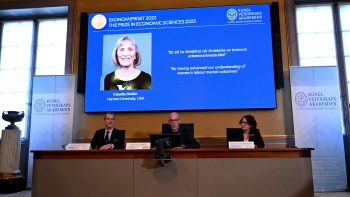
Is it time to rethink economics in a more human light?
As part of our Marketplace Economic Pulse series, we examine the economy from a range of perspectives.
Today, we hear from Clara Mattei, a professor of economics at the University of Tulsa In Oklahoma and director of the newly established Center for Heterodox Economics — which aims to reimagine how we measure economic progress, prioritizing people’s experiences.
She spoke with “Marketplace Morning Report” host David Brancaccio about the Center and its goal of centering people in our understanding of the economy. The following is an edited transcript of their conversation.
David Brancaccio: “Heterodox” — I had to look it up again — [it means] “unorthodox.” What’s the mistake orthodox approaches to economics we’re making that needs new thinking from your team?
Clara Mattei: It is absolutely timely to rethink economics in a broader, pluralist way, so that we’re not stuck in abstract and narrow methods that ultimately hide rather than explain what happens in the real world.
Brancaccio: One remedy for abstraction is to bring it down to earth and put people into the equation. Is there a greater focus on the human experience and the type of work that your center wants to do?
Mattei: The idea is that economics is not a hard science. It has been presented this way to give absolute authorities to experts that ultimately a lot of times justify economic systems that exclude people from decision-making. And as I worked in my own research, I showed that actually neoclassical economics a lot of times supports authoritarian regimes. So instead, the idea is that economics is based on social relations, that people are at the center of the economy, and thus we need to understand these social relations as something that can evolve, and thus we can have a greater say in what our economy should look like.
Brancaccio: The orthodox economic indicators had been showing the U.S. economy was in many ways fine and dandy; many people didn’t feel it was fine and dandy. So do you think some of your approaches to putting the experience of real people back into the analysis would resolve — I hate to use a big 50-cent word — but would resolve the dichotomy? Economic indicators saying things are great, people saying they’re not so great.
Mattei: This is exactly the point. People feel the economic injustices on their own skins. But there’s no tools to understand these, because the type of economics we’re exposed to operates to hide these problems. So the Center is trying to say, if we want to be academics and intellectuals and grow a generation of students that can really tackle issues for people, we need a different approach to economics. The agenda of economics has to be inspired by what people feel and live, and so people can be empowered by these tools in order to potentially participate for a better economic system.
Brancaccio: Professor Mattei, I don’t want to be a spoilsport, but I do have to raise this issue, which is, there was a lot of talk like this, in 2009 in 2010 after the great financial collapse — that mainstream economics didn’t see it coming, that mainstream economics needs new tools — and yet, here we are all these years later, and you’re forced to innovate again in this space. Do you think it’ll stick this time?
Mattei: That’s the real challenge. This is something that is ultimately a political battle. Academic battles are political battles because they are based on resources and the will of institutions. The University of Tulsa has the energy and the courage to give us the resources to start up this institution. We cannot do this alone, but I do think that we can serve as an example that may be able to multiply in which we say we can be a place of serious, courageous scholarship.
There’s a lot happening in the world. Through it all, Marketplace is here for you.
You rely on Marketplace to break down the world’s events and tell you how it affects you in a fact-based, approachable way. We rely on your financial support to keep making that possible.
Your donation today powers the independent journalism that you rely on. For just $5/month, you can help sustain Marketplace so we can keep reporting on the things that matter to you.
 It’s the last day of our March Fundraiser. Every donation makes a difference.
It’s the last day of our March Fundraiser. Every donation makes a difference. 
















